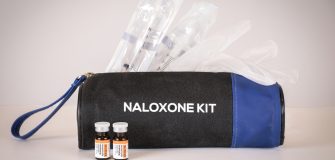Bridging Prevention and Recovery is a Win-Win in Our Nation’s Drug Epidemic
Share
After losing our son to an accidental overdose on his fourth day of college, my wife and I founded a national nonprofit focused on helping reverse the addiction fatality epidemic.
We, along with other organizations, are tackling this national emergency with urgency. However, we have discovered a worrisome tendency along the way: despite the enormous potential leverage of connecting prevention efforts with the knowledge and experience of those in recovery, these two communities rarely work together.
We have seen the effectiveness when law enforcement, prevention efforts, and links to treatment collaborate—the sum is greater than the parts. It is time for the prevention and recovery communities to join hands, particularly in this moment, as our nation is faced with a reported 28.5 percent increase in overdoses from 2020 to 2021 (CDC, 2021) and over 100,000 deaths—a record high in the twelve months preceding April 2021 (CDC, 2021)—fueled by the pandemic.
Both the prevention and recovery communities are extremely dedicated to their missions. The prevention community works tirelessly in diverse ways; from educating the public that addiction is a disease, to working to remove unused prescriptions that could be misused, to reaching out to vulnerable audiences to educate them on the pathways to substance dependence and how to avoid them. Meanwhile, the recovery community has a lot to offer the prevention community.
First, people in recovery are acutely aware of how addiction begins. In our experience, hearing a gripping personal story of just how someone became dependent and subsequently got into recovery is far more powerful than a “Just Say No” message delivered by someone with less understanding. People in recovery are highly adept at describing ways to enjoy life without abusing drugs or alcohol.
Second, while trained professionals are always available, there is nothing as valuable as consulting with someone who has been there. People in recovery can see signs of addiction long before others and can help parents or caregivers (who generally have very little knowledge of how addiction works) stem it before it becomes a full-blown problem.
Third, people in recovery have superb insight from their own life experiences on what works and what does not work to prevent and address addiction. They understand how to help someone find and maintain a solid recovery path, including a successful and supportive network.
We wish we had known the benefits of finding and working with someone in recovery long before our son slipped into real difficulty. People in recovery are determined and generous, and should be viewed as heroes for what they have overcome and for their willingness to help others. Indeed, we are not only proud to have several people in recovery on our staff, we do not know how we could execute our mission effectively without them. They were essential in creating SAFE Project’s Bridging Prevention and Recovery (BPR) program, which is evidence-based and designed to support substance use disorder (SUD) professionals to facilitate the integration of these traditionally siloed approaches.
Communities that successfully completed SAFE Project’s BPR program have taken steps to implement and operationalize a bridge between prevention and recovery. They have seen promising success. For example, since their participation in BPR in the spring of 2020, the United Way of Rutherford County, North Carolina has created a program for their local businesses that relies upon recovery and prevention best practices. Now, when an employee shows signs of substance use, they can ensure that the business owner knows how to talk with that person in a way that addresses it as a disease and without stigmatic language. Their certified peer support specialist floats throughout the community and helps employers connect their staff members to treatment, serves on-site in a mentoring role, and leads group stress debriefing sessions that address potential triggers for workers in treatment and recovery.
Suzanne Mizsur-Porter, executive director of Rutherford County’s United Way, shares, “We tend to speak about prevention as though it’s only for youth. But as a coalition, we’ve always stressed that everyone needs prevention in their lives. In prevention, we talk about ‘protective factors.’ In recovery, we talk about ‘supports.’ The reality is that they’re the same thing” (T. Steffek, February 27, 2021, personal communication).
In Dayton, Ohio, the Urban Minority Alcoholism and Drug Abuse Outreach Program (UMADAOP) has begun using peer support specialists to work across the areas of prevention, intervention, and recovery. UMADAOP’s Executive Director Dr. Marketa Robinson states, “We’re approaching recovery as it pertains to substance use, but also applying it to those who may be in recovery from domestic violence or a terminal illness too. Now we’re in the process of developing a healing circle, which unites our local faith-based community with our treatment providers and recovery community, so we can better serve the needs of our residents postpandemic” (T. Steffek, February 18, 2021, personal communication).
It is time for reluctant communities to overcome the stigma that accompanies people in recovery. We urge communities across our great nation to take advantage of their knowledge and commitment to serve. It may just save a life.
References
Centers for Disease Control and Prevention (CDC). (2021). Drug overdose deaths in the US top 100,000 annually. Retrieved from https://www.cdc.gov/nchs/pressroom/nchs_press_releases/2021/20211117.htm
About Me
Admiral James Winnefeld graduated from the Georgia Institute of Technology with a degree in Aerospace Engineering and served for thirty-seven years in the US Navy. He instructed at the Navy Fighter Weapons School, also known as Topgun, and served as senior aide-de-camp to General Colin L. Powell. He commanded a fighter squadron, the amphibious ship USS Cleveland, and the aircraft carrier USS Enterprise. As a flag officer, he commanded a carrier strike group, two NATO commands, the United States Sixth Fleet, United States Northern Command, and the North American Aerospace Defense Command (NORAD). He retired in 2015 after serving as the ninth vice chairman of the Joint Chiefs of Staff and the United States’ number two ranking military officer. Admiral Winnefeld is a frequently published author and a director or advisory board member for companies operating in a broad spectrum of business sectors. He was appointed in 2020 to serve as a member of the congressionally mandated National Commission on Synthetic Opioid Trafficking. Winnefeld currently serves as distinguished professor at the Sam Nunn School of International Affairs at Georgia Tech, where he is also a member of the Engineering Hall of Fame. He is a senior nonresident fellow at Harvard’s John F. Kennedy School of Government and is chairman of the Georgia Tech Advisory Board.







 Counselor Magazine is the official publication of the California Association of Addiction Programs and Professionals (CCAPP). Counselor offers online continuing education, article archives, subscription deals, and article submission guidelines. It has been serving the addiction field for more than thirty years.
Counselor Magazine is the official publication of the California Association of Addiction Programs and Professionals (CCAPP). Counselor offers online continuing education, article archives, subscription deals, and article submission guidelines. It has been serving the addiction field for more than thirty years.